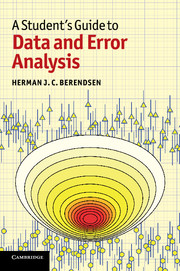Book contents
- Frontmatter
- Contents
- Preface
- Part I Data and error analysis
- 1 Introduction
- 2 The presentation of physical quantities with their inaccuracies
- 3 Errors: classification and propagation
- 4 Probability distributions
- 5 Processing of experimental data
- 6 Graphical handling of data with errors
- 7 Fitting functions to data
- 8 Back to Bayes: knowledge as a probability distribution
- References
- Answers to exercises
- Part II Appendices
- Part III Python codes
- Part IV Scientific data
- Index
1 - Introduction
Published online by Cambridge University Press: 05 June 2012
- Frontmatter
- Contents
- Preface
- Part I Data and error analysis
- 1 Introduction
- 2 The presentation of physical quantities with their inaccuracies
- 3 Errors: classification and propagation
- 4 Probability distributions
- 5 Processing of experimental data
- 6 Graphical handling of data with errors
- 7 Fitting functions to data
- 8 Back to Bayes: knowledge as a probability distribution
- References
- Answers to exercises
- Part II Appendices
- Part III Python codes
- Part IV Scientific data
- Index
Summary
It is impossible to measure physical quantities without errors. In most cases errors result from deviations and inaccuracies caused by the measuring apparatus or from the inaccurate reading of the displaying device, but also with optimal instruments and digital displays there are always fluctuations in the measured data. Ultimately there is random thermal noise affecting all quantities that are determined at a finite temperature. Any experimentally determined quantity therefore has a certain inaccuracy. If the experiment were to be repeated, the result would be (slightly) different. One could say that the result of a particular experiment is no more than a random sample from a probability distribution. When reporting the result of an experiment, it is important to also report the extent of the uncertainty, e.g. in terms of the best estimate of some measure of the width of the probability distribution. When experimental data are processed and conclusions are drawn from them, knowledge of the experimental uncertainties is essential to assess the reliability of the conclusion.
Ideally, you should specify the probability distribution from which the reported experimental value is supposed to be a random sample. The problem is that you have only one experiment; even if your experiment consists of many observations of which you report the average, you have only one average to report.
Information
- Type
- Chapter
- Information
- A Student's Guide to Data and Error Analysis , pp. 3 - 4Publisher: Cambridge University PressPrint publication year: 2011
